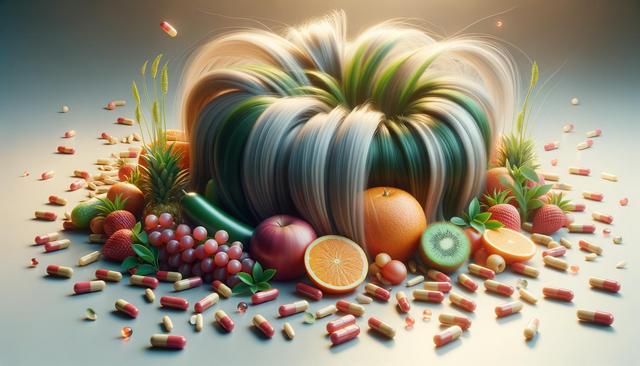The Role of Nutrition in Hair Health
Hair loss and thinning can stem from various causes, such as genetics, hormonal changes, stress, or poor diet. Among these, nutritional deficiencies are often overlooked yet play a significant role in the health of your hair. Hair follicles are among the most metabolically active structures in the body, requiring a steady supply of nutrients to function properly. Missing out on key vitamins and minerals can slow down hair growth, weaken strands, and even lead to noticeable shedding.
Incorporating a balanced diet that includes hair-supporting nutrients can make a difference in both the thickness and strength of your hair over time. While no single vitamin guarantees hair regrowth, maintaining adequate levels of specific nutrients can help create the ideal environment for hair to flourish. For those looking for an alternative to hair transplant procedures, focusing on nutrition may offer a more natural and less invasive solution.
Biotin: A Popular Choice for Hair Strength
Biotin, also known as vitamin B7, is frequently associated with healthy hair, skin, and nails. It plays a central role in the production of keratin, the protein that makes up your hair. A deficiency in biotin may result in hair thinning or brittle hair, which is why biotin supplements are often recommended for individuals experiencing hair loss.
Biotin can be found naturally in foods such as:
- Egg yolks
- Nuts and seeds
- Sweet potatoes
- Spinach
Consistent intake, whether through diet or supplements, can support the structural integrity of hair and promote a healthier scalp environment. While biotin alone will not reverse severe hair loss, it can contribute to improved hair texture and growth over time.
Vitamin D and Its Impact on Hair Follicles
Vitamin D is essential for a wide range of bodily functions, including the health of your hair follicles. Research suggests that vitamin D helps create new follicles and may stimulate dormant ones, making it particularly relevant for those experiencing hair thinning or patchy hair growth.
Low levels of vitamin D are commonly linked to various types of hair loss, including alopecia areata. Since it’s difficult to get enough vitamin D from food alone, especially during the winter months, supplementation may be necessary. Natural sources of vitamin D include:
- Sunlight exposure
- Fatty fish like salmon
- Fortified dairy products
- Egg yolks
Monitoring your vitamin D levels and speaking with a healthcare provider can help determine if a supplement is needed to support your hair goals.
Iron and Zinc: Vital Minerals for Hair Growth
Iron and zinc are two essential minerals that directly influence hair health. Iron helps red blood cells carry oxygen to your cells, including those that stimulate hair growth. Without enough iron, your hair follicles may not receive the oxygen they need to function efficiently, potentially leading to hair shedding.
Zinc, on the other hand, plays a role in tissue growth and repair, including that of the hair follicles. It’s also crucial for maintaining the oil glands around the follicles, which helps keep your scalp healthy. Deficiencies in zinc can lead to hair loss, dryness, and even scalp irritation.
To maintain healthy levels of these minerals, consider including the following foods in your diet:
- Lean red meat (for iron)
- Legumes such as lentils and chickpeas
- Pumpkin seeds (for zinc)
- Whole grains
In some cases, your doctor may recommend supplements, especially if blood tests reveal a significant deficiency.
Other Vitamins That Support Scalp and Hair Health
In addition to the more commonly known vitamins, several others contribute to a healthy scalp and hair regrowth. Vitamin A, for instance, helps your scalp produce sebum, an oily substance that moisturizes the scalp and keeps hair healthy. However, excessive vitamin A can lead to hair loss, so moderation is key.
Vitamin E is another important nutrient known for its antioxidant properties, which help reduce oxidative stress on the scalp—a factor that can contribute to hair thinning. Vitamin C supports the production of collagen, a key component of hair structure, and also helps the body absorb iron more efficiently.
Some key dietary sources include:
- Carrots and sweet potatoes (Vitamin A)
- Almonds and sunflower seeds (Vitamin E)
- Citrus fruits and bell peppers (Vitamin C)
Including a variety of these vitamins through whole foods can support overall hair and scalp wellness, creating the right conditions for regrowth and resilience.
Conclusion: A Natural Approach to Healthier Hair
For those seeking alternatives to hair transplant procedures, focusing on vitamin-rich nutrition can be a meaningful step toward revitalized hair. While results may take time and vary from person to person, maintaining a balanced intake of essential vitamins like biotin, vitamin D, iron, zinc, and others can support the natural hair growth cycle. Alongside a healthy lifestyle and proper hair care routine, these nutrients can help nourish your scalp and strengthen hair from within. If you’re unsure about your current nutrient levels, consulting a healthcare provider or registered dietitian can help you create a personalized plan that supports your hair goals effectively.


